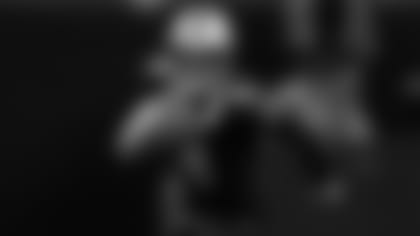Countless hours are poured into the process of becoming a savant and even then, there are plenty of ways that things can, and do, go sideways.
Still, when it comes to offensive innovation in the NFL, willingness to adapt, ability to find the right roles and spaces for the right players, and zeroing in on the right times to unveil and unleash the culmination of it all – often within a 25- to 40-second window – New Orleans Saints Coach Sean Payton and Kansas City Chiefs Coach Andy Reid have had seats reserved at the head table for the last two decades.
They'll pilfer a play from another NFL team, or from a college team. They'll tweak their own playbook to accommodate a specific set of skills on their own roster. They'll listen to their own players offer a twist on an existing play and if it's a player who has shown he can be trusted, honor the twist on the belief that the player's vision can come to fruition.
It's part gut feel, sure. It's also a result of the grind of preparation to find the right play, and has helped each guide his team to victory in a Super Bowl – Payton and the Saints in 2009, Reid and the Chiefs last season.
The Saints (10-3) play the Chiefs (12-1) at 3:25 p.m. Sunday in the Mercedes-Benz Superdome.
"I think you hope to – on Wednesday night, on Thursday night – you hope to, during the week, narrow down those thoughts," Payton said. "For instance, we work all Tuesday and when the players arrive Wednesday, they arrive for the first- and second-down gameplan. The running game, the play action, the dropback – first and second down. And then we practice that, and those go on certain areas of the call sheet.
"And then Wednesday night, we work just on third down – third-and-2 to -3, -4 to -6, -7 to -10, -11 plus. And we go through the run and pass thoughts in those down and distances, and then you begin to take shape. So it's not like when you're staring at a call sheet, you're just looking at, 'Let me select something out of 110 plays.' It'll actually be narrowed down to five if it's third down and 4 to 6 (yards). And so you're hoping to do, and make some of those decisions during the week and then arrive at them on game day.
"It's fast, the play's over, the clock's rolling, here we go. You have to force yourself, while your team's at the line of scrimmage, to be looking down at your next play. And if you get caught watching the play you're going to be behind in the call. And so, if it's second-and-8 and we're breaking the huddle, I'm looking at a third-and-8. I'm not looking at third-and-8 because I'm thinking negatively, but I'm just looking at, 'All right, what am I thinking third-and-8 here?' And if we gain six yards, quickly I go to third-and-2. But I think it's important that you're moving to the next call while your team is getting ready to run the next play.
"And sometimes that's easier said than done."
Reid, who oversees an offense that features shovel passes and underhand passes and an assortment of motions and shifts, said the combination of feel and scripted play always is present.
"Well, you do both," he said. "There's a point where you've just got to call and you've got to have an idea of why you're doing it and we all spend a lot of time at this. So trying to figure out what the opponent's got to do and what we do and best matchups and all those things. It takes a lot of time and not all of them are going to work, but you sure hope the majority of them do."
It helps when players have the ability to make them work. It also helps when players can add contribute to the innovation.
During the Saints' 21-16 victory over Atlanta on Dec. 6, quarterback Taysom Hill had a 6-yard run in the second quarter on which he faked a handoff to running back Alvin Kamara, then ran around right end and was forced out of bounds at the Falcons' 12-yard line.
When the half ended, on the way to the locker room, Payton asked Kamara his thoughts on what he was seeing. Kamara referenced the Hill keeper, and told Payton that the back side of the play was open for a handoff.
With 9:06 left in the third quarter and the Saints facing first-and-10 from the Atlanta 11-yard line, Payton called the play again, Hill handed off to Kamara, the linebacker vacated the back side just as Kamara had seen, and Kamara ran in for a touchdown.
"Yeah, so I called the play," Kamara later recalled, laughing. "But no, man, I'm always in tune. That's something I've been doing since I got here, just try to stay in tune. Like even with Drew (Brees), I ask him what he's seeing during the game. I ask everybody what they're seeing. I will even ask (backup quarterback) Jameis (Winston), like, what are you seeing? Because I don't have an ego in this, there's people that know more than me, but as long as I can kind of stay in their pocket like I feel like I know a lot.
"That look on that keeper play, it was a designed keep. Obviously, Taysom faked the ball to me, and I saw the whole part with that motion. Nobody was really worried about that backside. And I'm like, man, so when Sean asked me what plays I like, I'm like, man, let's run in the same motion. Let's go 15 Weak F instead of the keeper.
"So he dialed it up at the right time we got back down in that same kind of area and scored. I was coming off and he was like, 'You called that play?' And I was like yeah, you damn right. It's cool because Sean doesn't really have an ego. If there's an idea that somebody has that he thinks could work, he listens."
Payton said he has sensed the same with Reid, an ability to stay ahead of the curve.
"He's always had the ability to move forward, think forward, adjust," Payton said. "I was in the same division for a number of years – when Andy got hired at Philadelphia (from 1999-2012), I went to New York (from 1999-2002) as an assistant. We played them twice a year, and then of course Dallas (2003-05), the same way.
"When I got hired here, it seems like we played a few times early on. He's always been a true gentleman, he's been a football man through and through. He's one of those guys that I think is special."
Reid's adaptations have been with quarterbacks Donovan McNabb, Michael Vick and Patrick Mahomes II, among others.
Payton's variation at quarterback mainly has come the last two seasons. When Brees has missed a combined nine games, Payton has adapted the offense to fit the talents of Teddy Bridgewater (5-0 as a starter in 2019) and Hill (3-1 this season).
The Saints have been able to shift from a high-powered aerial attack to a ground and pound when the need has arisen.
"One thing about Coach P, man, is he knows the game in and out," tight end Jared Cook said. "And he's going to study it, man. That's one thing I love about being here, you know going into the game on Sunday, you're going to be as prepared as possible. And you're going to understand everything you are about to see going into the game. And he is going to make sure.
"He makes sure that when he calls a play in a certain situation that he is going to get to the right play. And it may take him a little while on the sideline to get that play in there. But for sure when that play's coming in, it's going to try to gash the defense as best as possible. He studies film like no other.
"And he'll be up here all night, just trying to figure out defenses and figure out a play to ensure that we have the right plays on offense on Sunday. And I think he does a great job of (readying) his quarterbacks for that – understanding the situations they're going to get, and when they're in those situations, if it is a bad one, how to get out of it.
"But if it is a good one, how to understand what we are trying to do to run the play and how we are trying to move the ball. So, preparation (and) game planning is tremendous."















